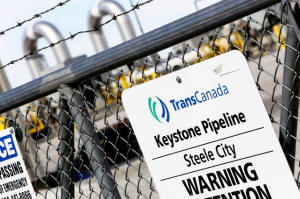Keystone pipeline spill pushes oil higher, fuels
TransCanada opponents
 Send a link to a friend
Send a link to a friend
 [November 18, 2017]
By Nia Williams and Kevin O'Hanlon [November 18, 2017]
By Nia Williams and Kevin O'Hanlon
CALGARY, Alberta/LINCOLN, Neb. (Reuters) -
A major oil spill on the Keystone pipeline in South Dakota helped push
U.S. crude prices higher on Friday, while fueling opposition to another
pipeline project by owner TransCanada Corp that faces a crunch decision
in Nebraska next week.
The climb in U.S crude futures and slide in Canadian heavy crude prices,
as well as TransCanada Corp shares, came the day after the 5,000 barrel
spill, tied for this year's largest pipeline leak in the United States.
No date has been set for reopening Keystone, TransCanada said, adding
that a media report that had identified a restart date was incorrect.
The spill gave further ammunition to environmental groups and other U.S.
opponents of another pipeline the company has proposed, the long-delayed
Keystone XL.

Keystone carries 590,000 barrels per day of crude from Alberta's oil
sands to markets in the United States. The state of Nebraska was set to
decide on Monday whether to approve Keystone XL.
On Thursday, Calgary, Alberta-based TransCanada said it had contained
the leak in the town of Amherst, South Dakota, and was investigating the
cause. It said the pipeline will be shut until it gets approval to
restart from the U.S. Pipeline and Hazardous Materials Safety
Administration (PHMSA).
"Itís not a tiny spill by any means," said Kim McIntosh, environmental
scientist manager at the South Dakota Department of Environment and
Natural Resources. McIntosh said it may take longer than usual for the
company to determine the extent of contamination, a process that usually
takes days.
The last Keystone pipeline spill recorded was about 400 barrels of oil
in Hutchinson County, South Dakota, in April 2016. "The 2016 release
took around 10 months to clean up; this will take longer," said
McIntosh. "I canít predict whether it will take 20 months or 12 months."
In Nebraska, Keystone XL opponents seized on the spill as an example of
its environmental risks.

"Pipelines are basically plumbing; and plumbing leaks. It comes as no
surprise," said Tom Genung, who lives near the proposed Keystone XL
route in Holt County, Nebraska.
The Nebraska Public Service Commission, or PSC, is scheduled to announce
a decision on Monday on Keystone XL. Its decision focuses narrowly on
whether the pipeline is in the public interest, and not on environmental
issues, which it is not allowed to consider.
[to top of second column] |

A TransCanada Keystone Pipeline pump station operates outside Steele
City, Nebraska March 10, 2014. REUTERS/Lane Hickenbottom/File Photo

Art Tanderup's family farm in Neligh, Nebraska, lies in the path of the 830,000
bpd Keystone XL project. He said the proposed XL pipeline would be built over
huge swaths of porous, sand-like soil atop the Ogallala aquifer, putting farmers
and ranchers at risk of water contamination if a spill occurs.
"We would have so much crud and chemicals in the Ogallala aquifer that we could
never clean up,Ē he said.
TransCanada shares closed down 0.9 percent on the Toronto Stock Exchange at
C$62.54.
The South Dakota spill ties with Januaryís spill from the Seaway pipeline near
Trenton, Texas, for the largest U.S. crude oil pipeline spill in 2017, U.S. data
showed.
TransCanada spokesman Terry Cunha said the company is assisting with the storage
of crude in Hardisty, where Keystone originates, and that it regrets the impact
caused to customers.
U.S. West Texas Intermediate crude ended up $1.41, or 2.6 percent, at $56.55 a
barrel. Traders said the shut-in would add to bullish sentiment due to fewer
barrels going into Cushing, Oklahoma, the delivery point of the WTI contract.
The WTI prompt spread (CLc1-CLc2) narrowed by as much as 8 cents.

If the pipeline is shut for a week, it would affect at least 2 million barrels
of crude going into Cushing, according to estimates by traders. The pipeline
also brings oil into Patoka, Illinois.
Export pipeline shutdowns also pressure the price of Canadian crude because
barrels get bottle-necked in Alberta.
The discount for Western Canada Select for January delivery in Hardisty,
Alberta, widened to $16.00 per barrel below the West Texas Intermediate
benchmark, according to Shorcan Energy brokers. On Thursday, January barrels
settled at $15.50 per barrel below U.S. crude.
(Additional reporting by Ethan Lou in Calgary, Alberta, Valerie Volcovici in
Washington and Catherine Ngai in New York; Editing by David Gregorio)
[© 2017 Thomson Reuters. All rights
reserved.] Copyright 2017 Reuters. All rights reserved. This material may not be published,
broadcast, rewritten or redistributed.
 |